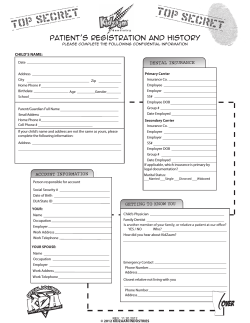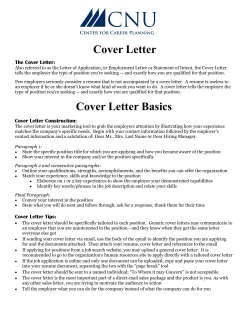
A Guide to Settlement Agreements for Employees
A Guide to Settlement Agreements for Employees Have you been presented with a settlement agreement by your employer and told to find a solicitor and obtain legal advice on the contents? Do you want to instigate settlement discussions yourself if you are unhappy at work? This can be a very stressful time for employees who are also concerned about incurring legal costs they cannot pay. The employment team at Morrisons Solicitors have significant expertise in advising on settlement agreements and other employment issues and this is recognised by legal directories such as Chambers & Partners and the Legal 500 in both of which we are ranked. Chambers 2012/13 says about us “The employment team gives robust economical advice in a friendly but professional manner." They are keenly aware of the issues of commerciality, cost and benefit and their level of client care reflects this." Joanne Kavanagh, Head of Employment is recognised to be a leader in the provision of employment advice. We have produced this information sheet to answer some questions you might have about settlement agreements. Q: What is a Settlement Agreement? A: A Settlement Agreement (previously called a Compromise Agreement) is a legal document that your employer can ask you to sign under which you will give up your rights to bring certain claims against it in relation to your employment or its termination. It is usual for the employer to instigate settlement discussions but sometimes the employee will do so. Q: If I’m giving up my rights to sue my employer what’s in it for me? A: To encourage you to sign the Settlement Agreement your employer will usually offer you a lump sum to be paid once you have signed. In most cases this is likely to be the notice pay to which you would have been entitled if dismissed and perhaps the benefits you would have been entitled to receive during that period, your accrued untaken holiday - plus a little bit more. The minimum notice on dismissal is one week per year of employment up to 12 weeks notice for 12 years or more service, unless your contract of employment provides for longer notice. If you do not have a contract and are in a senior position you may argue that reasonable notice would be longer than the statutory minimum. You may also want to be paid any bonus or commission or benefit from any share options. These are all matters for negotiation. Often money paid to you under a Settlement Agreement, where it is under £30,000 and represents genuine compensation for the loss of your employment, can be paid tax free. Q: Why have I been offered a Settlement Agreement? A: Sometimes a Settlement Agreement is offered so as to avoid an employer going through a dismissal procedure e.g. if it is claimed your job is redundant or if there are concerns about your performance or conduct. Other employers have a practice of offering employees whose posts may be redundant a compromise agreement, particularly where they are being paid in excess of their financial entitlements on termination of employment. You need to weigh up whether you would rather sign the settlement agreement and leave with a financial settlement and perhaps an agreed reference. We can help you think this through. Q: Do I have to accept what is offered in the Settlement Agreement? A: No. You may be able to negotiate a better deal with your employer and increase the compensation payment. However, this will depend on factors such as whether you have a potential tribunal claim that your employer wishes to settle, particularly if you are likely to receive a large award and how much your employer wants to dispense with your services and its normal practices – sometimes employees are offered a standard settlement agreement on a ‘take it or leave it’ basis. Q: Will I have to work out my notice period? A: Your employer might also agree to release you from working notice or release you from other onerous contractual obligations that apply after the termination of your employment. Q: Will I get a reference? A: To assist in your obtaining another job your employer may agree job reference wording with you. This can be very useful as you will then know what your employer will say about you and your termination of employment to your new employer. We advise this reference is attached to the Settlement Agreement. Q: Do I have to take legal advice and if so who pays for this? A: Because in signing the agreement you are waiving your right to bring tribunal claims you are required to obtain legal advice on the agreement. It is very likely your employer will contribute around £250 - £500 plus VAT towards your legal fees, provided you sign the agreement. Q: How can Morrisons help me? A: We can advise on: • • • • the contents of the settlement agreement negotiating a better package the merits and likely award of any claim you may have making the decision as to whether to accept what is being offered Only after taking proper legal advice and fully understanding your position can you properly weigh up the advantages and disadvantages and decide whether it is in your best interests to sign the agreement. Call us on 01737 854 500 and ask for a member of the employment team or email employment@morrlaw.com You can either arrange to meet a solicitor in the employment team or if you prefer, particularly where you do not dispute the settlement offer, you can email the agreement to us and we can discuss it over the telephone. Generally we will speak to you within 24 hours of your getting in touch.
© Copyright 2025





















